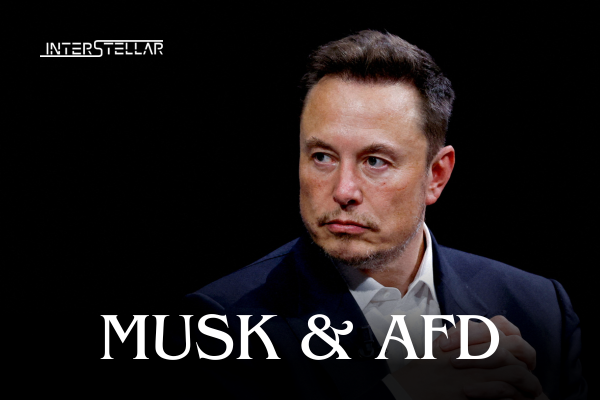Elon Musk Endorses Germany’s AfD Sparks Political Controversy
Elon Musk has urged Germans to support the far-right Alternative for Germany (AfD) in an upcoming election, amplifying his influence in European politics. Musk’s call came during a conversation with AfD leader Alice Weidel on his platform, X, where they discussed immigration, energy policy, bureaucracy, and even Adolf Hitler.
Elon Musk: AfD is Germany’s Solution
Musk described the AfD as essential to resolving Germany’s challenges, urging Germans to rally behind the party. “People really need to get behind AfD; otherwise, things are going to get much worse,” he said. He defended Weidel as a “reasonable” leader and dismissed concerns over the party’s policies as overblown.
This endorsement builds on Musk’s previous support for the anti-immigration, anti-Islamic party, which German security services have labelled as right-wing extremist. While AfD polls in second place, its isolation by other parties makes it unlikely to form a government. Critics warn, however, that Musk’s endorsement could boost the party’s popularity and undermine support for mainstream coalitions.
Tensions Over Musk’s Political Influence
Musk’s growing involvement in European and US politics has alarmed many. Last year, he used X to back Donald Trump’s 2024 US presidential campaign. His recent endorsement of the AfD has sparked concerns about his influence on democracy, with European leaders urging stricter enforcement of the EU’s Digital Services Act. The European Commission has stated it will review Musk’s actions under its probe into X for potentially favouring specific content.
A Conversation on Policy and Controversy
During the discussion, Musk and Weidel criticised Germany’s exit from nuclear power, calling it “crazy,” and argued that immigration policies were “out of control.” Musk recounted the bureaucratic challenges of establishing Tesla’s European plant in Germany, including navigating a 25,000-page permit process.
Weidel denied any similarity between the AfD and Hitler’s Nazi regime, controversially claiming Hitler was a “communist.” Historians overwhelmingly classify Hitler as far-right, making her statement a significant point of contention.
Broader Implications of Musk’s Support
Musk’s willingness to back far-right and anti-establishment parties has raised questions about his motivations. He defends his involvement in German politics due to Tesla’s significant investments and praises the AfD’s stance on deregulation and taxes. However, critics argue his actions risk eroding trust in democratic institutions.
As Musk continues to weigh in on international politics, European leaders remain vigilant. The unfolding debate highlights the challenges of balancing free speech with protecting democratic systems from undue influence.





